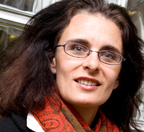Susan Hickman

Emma Anderson, an assistant professor in the Department of Classics and Religious Studies, is the recipient of a prestigious book prize from the American Academy of Religion. Her book, The Betrayal of Faith: The Tragic Journey of a Colonial Native Convert, explores the collision of Old World French Catholicism with traditional North American aboriginal beliefs of the 17th century through the intimate study of Pierre-Anthoine Pastedechouan, an Innu.
Anderson, 38, received the Best First Book in the History of Religion prize at the academy's annual convention in November for the book, which was published last year by Harvard University Press.
When Pastedechouan was 11, he was taken from his Innu tribe to a convent in France by Récollet missionaries. There, he was converted to Catholicism and learned French and Latin, and then returned to his homeland at the age of 16 in the expectation that he would help convert other Innu to Christianity.
Anderson suggests Pastedechouan was “one of the first residential school kids” -- unable to be either native or Catholic. “He was divided in his identities, a man with a hybrid identity torn between two cultures.”
Pastedechouan, who lacked the requisite skills of his tribe for hunting and fishing, froze to death on a hunting trip at the age of 28.
The Betrayal of Faith also received the French Colonial Historical Society's Heggoy Prize and is expected to be published in French in 2009.
In her current project, supported by the Social Sciences and Humanities Research Council of Canada, Anderson hopes to develop and explore issues of aboriginal-missionary violence in colonial Canada, focusing particularly on Jean de Brébeuf, the Jesuit missionary tortured to death by the Iroquois in 1649.
Her interest in questioning the paradigm of martyrdom stemmed from a visit to southwestern United States, where she saw adobe churches, and then her discovery at Harvard University of documents written by Jesuit missionaries.
“I became hooked on the cultural collision between Aboriginals and Europeans. There aren’t many biographies of Aboriginal people. In order to have a balanced history, we need to understand that Aboriginals have their own individual history. I want to correct that historical imbalance.”